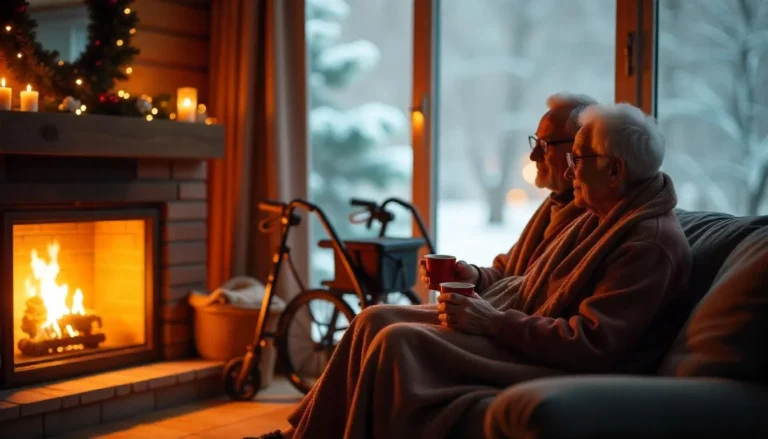Winter might bring cosy evenings and festive cheer, but for the elderly, it also brings icy pavements, chilly temperatures, and increased risks indoors. If you’re responsible for the care of an elderly loved one, it’s important to take extra precautions during the colder months. From preventing slips and chills to ensuring they can continue enjoying their independence, we’ve got you covered.
Here’s your guide to keeping your loved ones safe and supported at home, out and about, and even through the hustle and bustle of winter social events.
Winter Risks and How to Stay Ahead
Winter conditions present a unique set of challenges for older adults, but the good news is? You can plan to minimise risks.
Colder weather doesn’t just hit hard outside. Indoors, older adults are more prone to issues like reduced mobility, the impact of lower temperatures, and limited access to support.
Tips to Ensure Indoor Safety
- Keep indoor temperatures cosy: Ensure the thermostat is set to a comfortable 18–21°C to prevent the risk of hypothermia. Stock up on blankets, hot water bottles, and cosy slippers.
- Prevent slips and falls: Add slip-resistant mats to slippery areas (think bathrooms and kitchens) and make sure walkways are clutter-free.
- Get on top of winter illnesses: Book flu jabs, check their Vitamin D levels, and stockpile cold and flu remedies.
- Install night lights: Navigating in the dark? No, thank you. Motion detector lights are a great addition.
Preparing for Hot Water Emergencies
Winter places extra demands on your home’s hot water system, from increased heating needs to more frequent showers after outdoor activities. Water heaters work harder during cold months, making them more susceptible to issues like sediment buildup, thermostat malfunctions, or heating element failures. For elderly individuals, especially, a sudden loss of hot water can be more than an inconvenience-it can impact their ability to maintain proper hygiene and stay warm.
Having a plan in place before problems arise is sensible, so keep contact details for reliable services handy and familiarise yourself with warning signs like inconsistent water temperature, unusual noises, or water pooling near the tank. If you experience a complete hot water failure during winter, options like emergency hot water heater repair can help restore comfort quickly, though it’s worth exploring local providers who offer similar urgent services to your area.
The Challenge Outdoors
Icy paths, colder conditions, and shorter days make heading outdoors trickier but not impossible. Encouraging your elderly family member to stay active is vital for mental and physical health, even in winter.
Tips for Staying Safe Outside
- Layer up! Opt for thermal base layers, scarves, hats, gloves, and weather-resistant outerwear for extra insulation.
- Weatherproof footwear: Invest in slip-resistant shoes or boots for a solid grip on slippery pavements.
- Plan walks carefully: Stick to well-lit routes and avoid slushy or icy paths. If necessary, partner up with them to ensure they’re steady on their feet.
- The role of mobility aids: If walking longer distances becomes difficult, consider introducing a rollator or a mobility scooter into their routine.
Winter Independence with Mobility Aids
Retaining independence is key to any elderly person’s dignity and quality of life, and mobility aids are the ultimate partners in freedom and safety.
The Benefits of Rollators
Rollators are four-wheeled walking aids with support handles and brakes. They’re perfect for those who can walk but need a bit of extra support, especially on winter days.
Why a rollator?
- Provides stability on uneven or icy ground.
- Comes equipped with a handy built-in seat for mid-walk rests.
- Features baskets or pouches for carrying winter shopping, gloves, or even a flask of hot tea!
Mobility Scooters—a Game Changer
For elderly individuals with more limited mobility, mobility scooters boost confidence and comfort. Heading to a social event or ticking off Christmas shopping lists? Scooters enable participation without compromising safety.
Why a mobility scooter?
- Easily handles longer distances with minimal strain.
- Weatherproof options keep them rolling no matter the season.
- Many models are compact, easy to charge, and simple to store when not in use.
Winter can feel isolating, especially for older adults unable to travel to family get-togethers. Mobility aids ensure they can enjoy the joy of gathering during the holidays, as active participants, not spectators.
Winter Wellness Is Key
Beyond physical safety, you can also help your loved one stay mentally strong during the colder months.

1. Build Routine
Encouraging a daily schedule helps balance rest, activity, and social interaction. Whether it’s a scheduled afternoon tea with family or simply reading a book by a warm fire, structure provides comfort.
2. Encourage Social Connections
Social isolation is a significant challenge for many older adults during winter. Help organise regular visits, chat on the phone, or arrange group activities through local community centres.
3. Keep Them Active
Exercise doesn’t have to mean hefty gym sessions! Light stretching, neighbourhood walks (using a mobility aid if needed), or gentle yoga can make a difference to overall health and happiness.
Investing in Safety and Independence
Winter safety shouldn’t mean sacrificing your elderly loved one’s independence or enjoyment. Mobility aids like rollators and scooters create a bridge between the comfort of safety and the freedom to live well.
If you’re unsure which aid is right for your loved one, start by evaluating their specific needs. Do they struggle with fatigue on shorter walks? A rollator’s seat could be ideal. Do longer trips for errands feel overwhelming? A mobility scooter might be just what they need.
Help Your Loved One Stay Safe This Winter
Supporting your elderly loved one through winter doesn’t have to be daunting. With proactive planning, you’re setting them up for a safe, active, and enjoyable season. Winter should be about comfort, joy, and shared moments, not worry.
By taking these proactive steps, you can ensure your ageing loved ones enjoy a safe, warm, and fulfilling winter season. For more helpful tips and insights, visit NextMagazine today!

